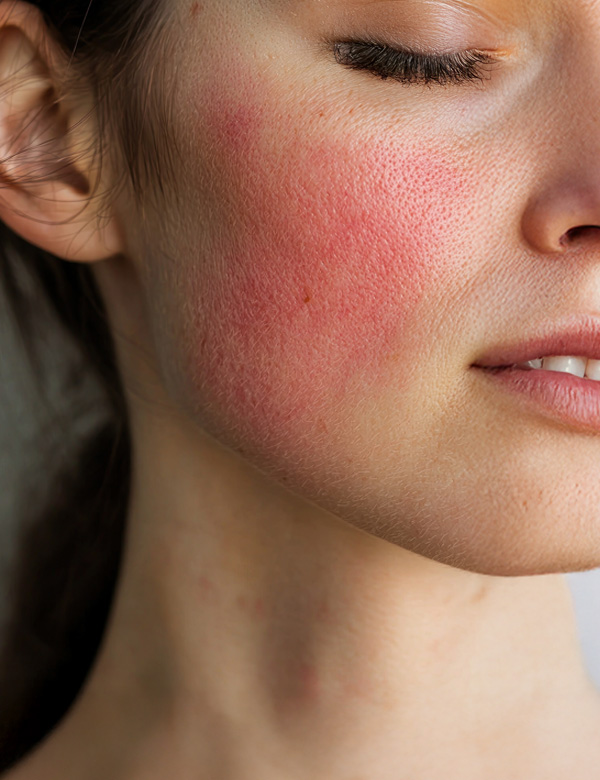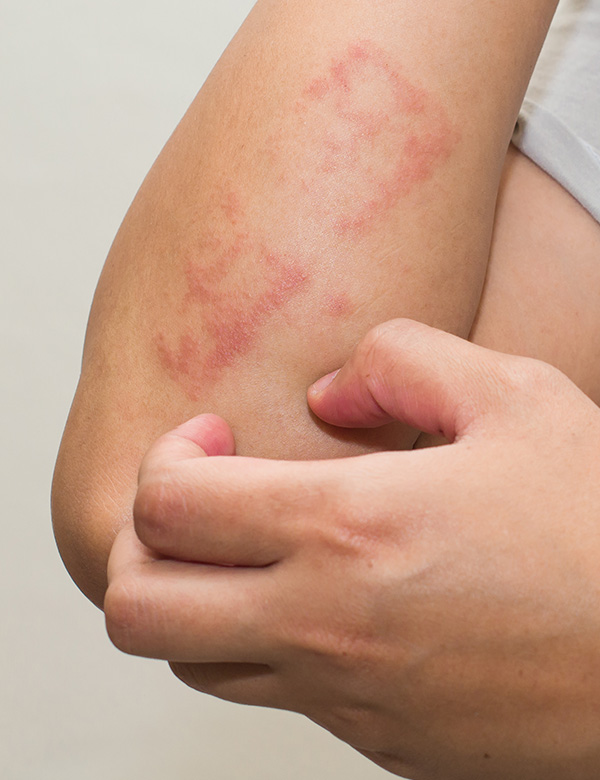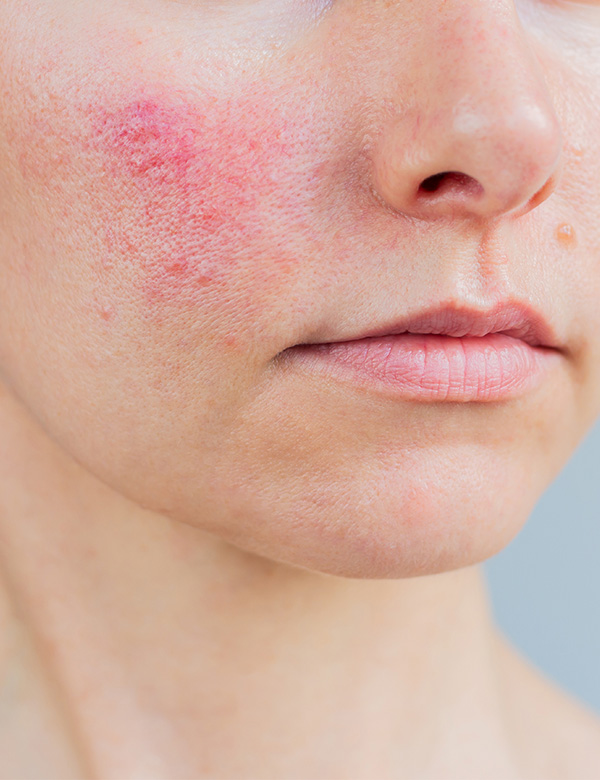Excessive Sweating on Hands, Feet, and Armpits
Effective treatment for heavy sweating – by experienced dermatologists at Derma Medical Clinic in Zurich-Sihlcity
Excessive Sweating on Hands, Feet, and Armpits
Chronische Abszesse und schmerzhafte Knoten durch erfahrenen Hautarzt abklären und behandeln in der Derma Medical Clinic in Zürich - Sihlcity
Excessive sweating on the armpits, hands or feet – identifying hyperhidrosis as a medical condition and treating it with Botulinumtoxin or iontophoresis
Examinations
Dermatological assessment
Ruling out possible internal causes
Procedure
Duration
between 20 and 30 minutes
Why does excessive sweating occur?
Excessive sweating – known medically as hyperhidrosis – means the body produces more sweat than necessary, even at rest, in normal temperatures or without exercise.
There are two main types: Primary hyperhidrosis is when the sweat glands work overtime without an underlying medical reason.
Secondary hyperhidrosis is caused by another condition or certain medications.
A medical check makes sense if you …
- sweat heavily even at rest – for example on the armpits, hands or feet
- often have to deal with wet clothing or sweaty palms
- break out in sweat even though it’s neither hot nor physically demanding
- suspect your sweating might have a medical cause (hyperhidrosis)
- want medical treatment because home remedies or antiperspirants don’t help

Why does excessive sweating occur?
Excessive sweating – known medically as hyperhidrosis – means the body produces more sweat than necessary, even at rest, in normal temperatures or without exercise.
There are two main types: Primary hyperhidrosis is when the sweat glands work overtime without an underlying medical reason.
Secondary hyperhidrosis is caused by another condition or certain medications.
Who should consider a check-up and treatment for excessive sweating?
A medical check makes sense if you …
- sweat heavily even at rest – for example on the armpits, hands or feet
- often have to deal with wet clothing or sweaty palms
- break out in sweat even though it’s neither hot nor physically demanding
- suspect your sweating might have a medical cause (hyperhidrosis)
- want medical treatment because home remedies or antiperspirants don’t help
Treatment
The dermatologist examines the affected areas and rules out possible internal causes – for example, through blood tests or questions about medications, thyroid issues or hormone levels.
What happens during treatment?
Depending on how severe the sweating is, we offer different options:
Botulinumtoxin is injected into the affected skin to temporarily block the sweat glands. The effect lasts for several months.
For sweating on the hands or feet, we can use tap water iontophoresis – a medical water bath with mild electric current that reduces sweat gland activity.
In milder cases, we also advise on special skincare products, useful habits and other supportive treatments.
How does the treatment process work?
Initial consultation & skin examination
At your first appointment, we’ll talk in detail about your symptoms. The dermatologist examines the affected areas and checks whether it’s primary or secondary hyperhidrosis.
Treatment recommendation
Depending on location and severity, Botulinumtoxin, iontophoresis or supportive skincare advice may be appropriate. We explain clearly which option suits your needs.
Treatment
Treatment takes place directly at our clinic. Botulinumtoxin injections usually take just a few minutes and can be done discreetly. Iontophoresis sessions are started here with professional guidance.
Follow-up care & support
We continue to support you after treatment starts: We regularly assess how well it’s working, how long the effect lasts, and adjust the treatment if needed.

At Derma Medical Clinic, hyperhidrosis is treated exclusively by our experienced dermatology specialists:
- Benjamin Miller, specialist in dermatology and phlebology
- Markus Dendorfer, specialist in dermatology and expert in pediatric dermatology
Both doctors have many years of experience in the diagnosis and treatment of chronic inflammatory skin conditions.

Dr. med. Benjamin Miller
Board-certified Specialist in Dermatology & Venereology FMH

Dr. med. Markus Dendorfer
Board-certified Specialist in Dermatology & Venereology FMH
What to expect at our clinic
Years of experience with hyperhidrosis
Our specialists have extensive experience with many types of hyperhidrosis.
Discreet, confidential on-site treatment
Excessive sweating is a sensitive topic – that’s why we focus on respectful communication, clear information and a calm, welcoming atmosphere.
Thorough medical evaluation
We identify the actual cause of your sweating and determine whether it’s a standalone condition (primary hyperhidrosis) or linked to other factors (secondary hyperhidrosis). If needed, we add lab tests or further diagnostics.
Everything under one roof
You receive diagnosis, medical treatment and cosmetic support all in one place – with consistent contacts, short paths and coordinated care from your first visit to follow-up.
You don’t have to live with constant sweating, damp armpits, sweaty hands or sudden sweating attacks.
Book your appointment now for a check-up and possible treatment of hyperhidrosis at Derma Medical Clinic in Zurich – Sihlcity.
FAQ – Common Questions About Excessive Sweating
What is hyperhidrosis?
Hyperhidrosis is the medical term for excessive sweating – unrelated to heat, movement or exertion. It often affects the armpits, hands, feet or face. The condition is not dangerous, but can be very distressing. With targeted treatment, sweating can often be reduced.
How can I recognize hyperhidrosis?
Typical signs include heavy, sudden sweating – usually symmetrical and without an obvious reason. Affected areas may be constantly or intermittently damp, leading to skin irritation, discomfort or social challenges.
What causes excessive sweating?
There are two main types:
- Primary hyperhidrosis: usually begins in adolescence and is not caused by another condition.
- Secondary hyperhidrosis: results from another illness or medications.
A medical evaluation helps clarify the cause.
When should I see a doctor for heavy sweating?
If sweating affects your daily life, suddenly changes, or occurs with other symptoms like fever, weight loss or heart palpitations, you should see a doctor – such as a specialist in dermatology.
How is hyperhidrosis treated?
Treatment depends on how severe the sweating is and where it happens. Options include:
- Antiperspirants with aluminum chloride
- Tap water iontophoresis (especially for hands and feet)
- Botulinumtoxin injections to block sweat glands
- Medications
- In rare cases: surgery (e.g. sweat gland removal)
What is tap water iontophoresis?
This involves placing hands or feet in shallow water baths with a mild electric current. This reduces sweat production and works especially well for hands and feet.
Is iontophoresis painful or risky?
The procedure is generally well tolerated – usually you feel only a slight tingling. It’s considered safe, but shouldn’t be used by people with certain conditions like pacemakers or during pregnancy.
How often do you need iontophoresis?
Initially, treatment is done several times per week. Once it starts to work, 1–2 sessions per week are enough to maintain results. With regular use, sweating can be significantly reduced.




